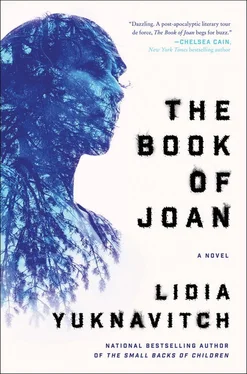My room ignites with holographic projections: fragments of Jean de Men’s evolution. It’s a perfect and terrifying consumer culture history, really. His early life as a self-help guru, his astral rise as an author revered by millions worldwide, then overtaking television—that puny propaganda device on Earth—and finally, the seemingly unthinkable, as media became a manifested room in your home, he overtook lives, his performances increasingly more violent in form. His is a journey from opportunistic showman, to worshipped celebrity, to billionaire, to fascistic power monger. What was left? When the Wars broke out, his transformation to sadistic military leader came as no surprise.
We are what happens when the seemingly unthinkable celebrity rises to power.
Our existence makes my eyes hurt.
People are forever thinking that the unthinkable can’t happen. If it doesn’t exist in thought, then it can’t exist in life. And then, in the blink of an eye, in a moment of danger, a figure who takes power from our weak desires and failures emerges like a rib from sand. Jean de Men. Some strange combination of a military dictator and a spiritual charlatan. A war-hungry mountebank. How stupidly we believe in our petty evolutions. Yet another case of something shiny that entertained us and then devoured us. We consume and become exactly what we create. In all times.
I stare at a holographic snippet: Jean de Men’s head grotesquely bulbous, his garish face all forehead: “Your life is not for them, not for the putrid detritus resisting the future, clinging to Earth for a life that cannot be sustained. Earth was but an early host for our future ascension. Your life can have meaning and justification if you but turn your sights toward a higher truth.” I recognize these words from his weekly, unstoppable addresses that puncture all the rooms of CIEL, recitations of the best of his own quotes.
Bile bubbles up my throat.
I skip around the stupid recording, trying to locate that song, but I can’t find a trace of it. I start to second-guess myself: Why did I associate it with him? Had I imagined it as a ludicrous soundtrack to his rise to power? And, if not from then, from where? It was almost as if the song came from the cosmos around us, from the giant mouth or throat I sometimes imagine we are living within.
“Resume audio recording,” I say, taking a breath. “Go back. I first attracted attention in CIEL when I questioned the literary merit of a highly regarded author of narrative grafts, Jean de Men.” I wipe my brow. Though I haven’t perspired in years, I’m sure I feel moisture there.
“The graft he created was a romance graft, of all things, and it became quite famous: widely purchased, widely celebrated by so-called experts, widely and absurdly adulated, and though no one likes to admit this, widely exchanged between bargain shoppers who wanted knockoffs and cheaply made things amidst the smutted alleys of the black market. Everyone, everywhere, had to have it.
“Why? Because, even in this de-sexualized world, the idea of love and all her courtesans—desire, lust, eroticism, the chase, the capture, the devouring—had a stubborn staying power. In the end, for those of us who survived and ascended, who agreed to a finite life span in exchange for part of a life—our last wish didn’t turn out to be power or money or property or fame. Everyone’s last wish turned out to be love: may I be consumed by the simplicity and purity of a love story, any love, base love or heroic love or transgressive love or love that is a blind and lame and ridiculous lie—anything the opposite of alone and lonely and sexless, and the absence of someone to care about or talk to. The hunger for love replaced the hunger for god or science. The hunger for love became an opiate. In a world that had lost its ability to procreate, the story of love became paramount.
“It was a wish like the moth’s wish for flame. It was a wish to fuck the sun. To be burned alive inside a story where our bodies could still want and do what bodies want to do.
“You see, radical changes in the magnetic field induced radical changes in the morphology of life. That part everyone knew to expect. What no one knew for certain was how quickly these changes would occur after the geocatastrophe and the subsequent forms of radiation. These radical changes happened faster to us than they ever had to lab rats or chimps. That’s what happens when geocatastrophe is amplified by radiation. Put simply, we devolved. Our sexualities mutated and devolved faster than you can say fuck .
“The end of genitalia. Our bodies could no longer manifest our basest desires nor our lofty ideas of a future. In our desperation and denial, we turned to the only savior in sight, technology and those who most loudly inhabited it. After we tired of television, after we tired of films, after social media failed to feed our hungers, after holograms and virtual realities and pharmaceuticals and ever more mind-boggling altered states of being, someone somewhere looked down in despair at the sad skin of his or her own arm and noticed, for the first time, a frontier.”
I take a colossal breath of air and hold it. I hold my arms out in the air to either side of me. In the mirror I look vaguely like a butterfly. I blow the air out and watch my own skin sack deflate.
Skin. The new paper. Canvas. Screen.
In the form of scarification, we made art of what was left of our own dumb flesh.
“In the wake of our hunger, up here in our false heaven, skin grafts were born.” I pace the room, talking to no one, continuing my narration. “Grafts were skin stories: a distant descendant of tattoos, an inbred cousin of Braille. Before long, you could judge people’s worth and social class by the texture of their skin. The richest of us had skin like a great puffed-up flesh palimpsest—graft upon graft, deep as third-degree burns, healed in white-on-white curls and protrusions and ridges. One had to stare into a face for longer than a minute to find the wallows where eyes should be, the hole where a mouth still lived. Faces looked like white piles of doilies from some medieval era. Even hands bloomed with intricate and white raised welts and bumps.
“At the time, I was selling grafts myself: erotic micrografts particularly suited for that soft sweet hollow between the jaw and shoulder where, when a person turns their head in shyness or desire, a little flesh cup forms. Go ahead. Lean your chin to your own shoulder and you’ll have some idea of it.
“I’d made grafts into a fine little business for myself, of necessity: after my husband died in the first round of CIEL epidemics, I had to support myself.”
I try to say my husband’s name. I open my mouth in the shape of his name, and I still cannot enunciate it. His death happened so swiftly—like one sharp breath. My grief bore a hole down into me, replacing that former aperture of life.
“My grafts were of no outstanding literary merit, but they fed a need in people—these little love grafts they could touch during the day when they felt alone or sad, their eyes closed for a moment, their hands at their necks, their thoughts turned to some past amorous instant. Women in particular were my main clientele, but men bought them as well. I suppose they are sentimental. When most sensory experience has been obliterated, perhaps sentimentality is the only defense against loneliness.
“Men are among the loneliest creatures. They lose their mothers and cannot carry children, and have nothing to comfort themselves with but their vestigial cockular appendages. This is perhaps the reason they move ever warward when they are not moving fuckward. Now that the penis is defunct, a curling-up little insect, well, who can blame them for their behaviors?
Читать дальше












